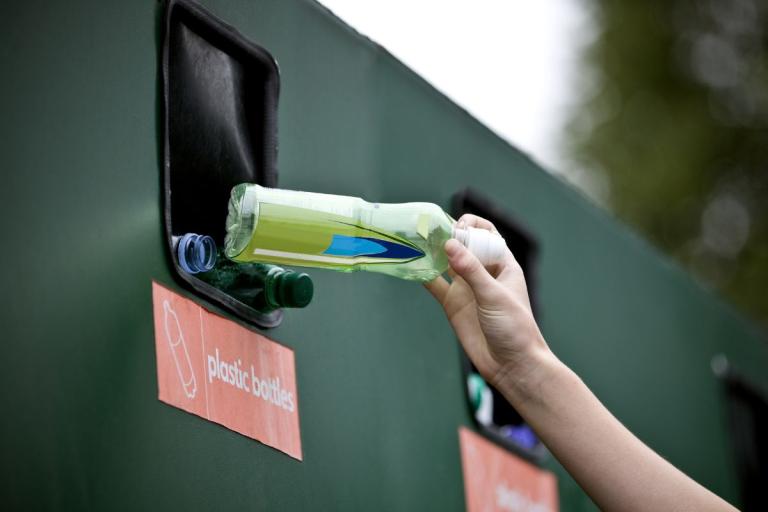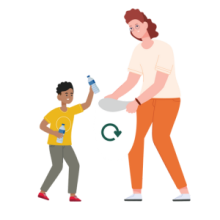- plastic crates / storage boxes
- liquid barrels (no liquids inside)
- large garden toys (minimal metal accepted)
- rigid plastic pipes, piping
- wheelie bins
- water butts
- recycling boxes, food caddies
- rigid plastic plant pots
- plastic buckets
- empty liquid drums
- plastic garden furniture
Plastic recycling

Why recycle your plastic?
When you place accepted plastic items in your kerbside recycling collection, your plastics are sent for recycling and can be made into a wide variety of new plastic items.
Using recycled materials in the manufacturing process to make plastic significantly reduces the use of non-renewable resources, energy and carbon emissions.
How is plastic recycled?
Plastic bottles, tubs and trays are separated from other recyclable materials by hand or machine. They are cleaned, sorted and arranged by colour - blue, natural, green and mixed.
They are then shredded, washed, melted and formed into pellets which can then be used to make new items including bottles, fleeces, furniture or children’s toys.
Plastic accepted for recycling
All plastic bottles are accepted for recycling in your kerbside collection in Essex. This includes plastic bottles from all around the home, so don’t forget to pop items like bleach bottles and shampoo bottles in your plastic recycling.
Plastic food packaging such as pots, tubs and trays are sometimes accepted for recycling. Find out if your local council can accept plastic food packaging for recycling.
Plastic not accepted for recycling
Hard plastics such as toys, buckets, storage boxes and washing baskets are not accepted for recycling in your kerbside collection, and should be placed in your general rubbish bin if you cannot recycle them at a recycling centre. Please see below for details of the rigid plastic recycling scheme at recycling centres.
Soft plastics, such as crisp packets, sweet wrappers, biscuit wrappers, bubble wrap and laminated pouches cannot currently be recycled at the kerbside. However many supermarkets now accept them for recycling.
Other items such as nappies and polystyrene are not recyclable and should be placed in your general rubbish bin.
Plastic recycling at recycling centres
Plastic bottle recycling
All 21 Essex County Council recycling centres accept plastic bottles for recycling, however the easiest way to recycle these plastics is by using your kerbside collection.
Rigid plastic recycling
A rigid plastic recycling scheme is in place at the following recycling centres:
- Braintree
- Brentwood
- Burnham-on-Crouch
- Clacton
- Chigwell
- Colchester
- Harlow
- Saffron Walden
- Witham
It will soon be available at Mountnessing and Rayleigh recycling centres.
Items accepted for rigid plastic recycling
Items not accepted for rigid plastic recycling
- bollards
- traffic cones
- plastic film / bags
- plastics with paint residue
- underfloor heating pipe/casing tube
- car seats
- suitcases
- garden hoses
- cool boxes
- polystyrene
- coat hangers
Other plastics
Unfortunately, recycling centres are unable to accept other plastics for recycling such as pots, tubs and trays. This is for a number of reasons:
- recycling centres are designed to provide additional services to those at the kerbside
- each local authority will have an agreed set of recyclables they can accept at the kerbside. As most local authorities collect pots, tubs and trays this is not a service that can be replicated at recycling centres
- only small quantities of pots, tub and trays are received at recycling centres, and therefore the small quantities and unstable markets means it is not viable to offer a collection
- due to the lack of space at recycling centres, material streams that are not already offered at the kerbside have to be prioritised

Did you know?
Recycling a single plastic bottle will save enough energy to power a lightbulb for three hours or more!
